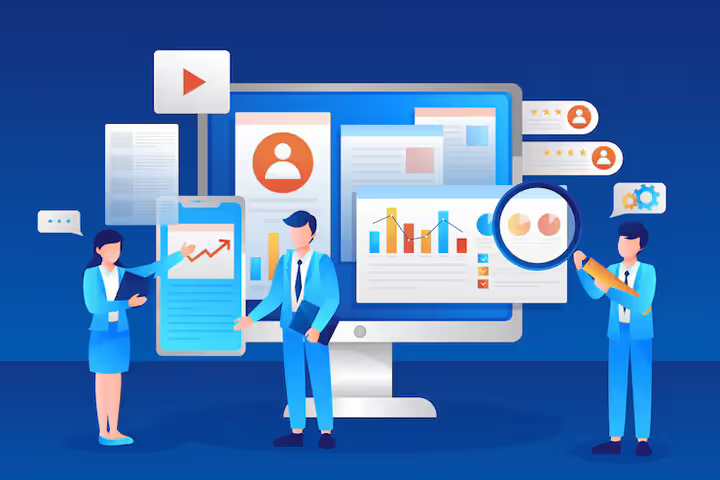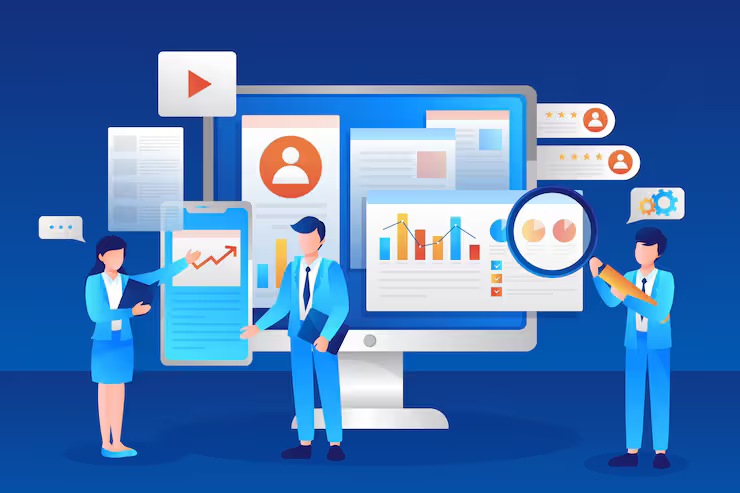
Best CRM Platforms Explore Expert Insights and Practical Guidance
Customer Relationship Management (CRM) platforms are systems designed to organize, track, and analyze customer interactions throughout the entire business lifecycle. Originally used as simple contact databases, CRM systems have evolved into intelligent, automated platforms that support marketing, sales, customer engagement, and analytics all in one place.
Their core purpose is to give organizations a unified view of every customer interaction—emails, calls, meetings, sales stages, feedback, and support history—so teams can work more efficiently with accurate, real-time data.

Importance
CRM platforms are essential in today’s business environment, where personalized experiences and fast communication are expected. Businesses rely on CRMs to:
-
Maintain organized and accessible customer data
-
Automate repetitive tasks like follow-ups and reminders
-
Improve sales pipeline visibility
-
Enhance customer retention
-
Support collaboration between sales, marketing, and service teams
-
Strengthen long-term decision-making with analytics and forecasts
A reliable CRM system benefits small businesses by helping them scale efficiently, while large organizations depend on CRMs to manage complex customer journeys and multi-team workflows.
Recent Updates & Trends (2024–2025)
The CRM landscape is rapidly evolving, especially with advancements in artificial intelligence and data automation. Major trends include:
Rise of AI Agents
AI-powered CRM agents can now respond to natural language questions, automate sales tasks, generate customer communication, and support team workflows with minimal manual effort.
Integrated Communication Hubs
CRMs are increasingly becoming unified communication platforms. Email, chat, calls, and social messages are integrated so teams can track all customer touchpoints in one place.
Predictive Intelligence
More CRM platforms now offer built-in predictive analytics such as:
-
Lead scoring
-
Sales forecasting
-
Churn prediction
-
Sentiment tracking
These features help businesses understand customer behavior and take faster action.
Smarter Workflow Automation
Automated workflows are becoming more advanced, allowing teams to set up triggers for nurturing, hand-offs, pipeline updates, and task assignments without coding.
Industry-Specific CRM Solutions
CRMs tailored for real estate, healthcare, finance, insurance, and logistics are growing rapidly. These versions include specialized dashboards and workflows aligned with industry needs.
AI Performance Benchmarks
New testing frameworks evaluate how well CRM-related AI agents perform tasks such as lead routing, message generation, and deal updates. This pushes vendors to continuously improve real-world accuracy and reliability.
Laws and Policies
CRM usage directly interacts with data protection rules, making compliance a major factor:
Data Privacy Regulations
Countries worldwide enforce strict rules on how customer information can be collected, stored, and processed. This includes:
-
Consent requirements
-
Data minimization
-
Secure storage
-
Controlled access permissions
Businesses must configure their CRMs to meet these standards.
India’s Digital Personal Data Protection (DPDP) Framework
For Indian businesses, the DPDP guidelines emphasize:
-
Transparent customer consent
-
Secure data storage
-
Right of customers to request correction or deletion
-
Ensuring CRM vendors meet privacy standards
Security & Audit Policies
Organizations must ensure their CRM supports:
-
Role-based permissions
-
Data encryption
-
Two-factor authentication
-
Audit trails for sensitive actions
Following these policies helps protect customer trust and maintain regulatory compliance.
Tools and Resources
Useful tools and resources related to CRM planning, setup, and optimization include:
CRM Comparison Tools
Platforms that compare features, integrations, and functionality of leading CRM systems help businesses choose the right fit.
Open-Source CRM & ERP Solutions
Open-source CRM options allow full customization and flexibility for businesses that require tailored workflows.
CRM Templates
Helpful templates for:
-
Sales pipelines
-
Customer journey mapping
-
Email sequences
-
Lead qualification frameworks
These support faster CRM setup.
AI Workflow Builders
AI-driven tools help automate CRM-related tasks such as message drafting, lead scoring, and analytics generation.
Training & Process Mapping Tools
Diagramming tools and onboarding resources help teams understand CRM workflows, boosting adoption and efficiency.
FAQs
Q: Which CRM is best for small businesses?
A: The best CRM depends on your workflow needs. Look for easy setup, customization options, mobile access, task automation, and a clean dashboard that your team can use comfortably.
Q: How does AI improve CRM performance?
A: AI enhances CRMs by automating tasks, suggesting next actions, analyzing customer sentiment, predicting sales performance, and generating personalized communication.
Q: What challenges do businesses face when adopting a CRM?
A: Common challenges include low team adoption, unclear workflows, overly complex setups, and difficulty integrating the CRM with existing tools. These challenges can be managed with proper onboarding and process mapping.
Q: Can small teams use CRM effectively?
A: Yes. Even very small teams benefit from CRMs because they simplify tracking customers, reminders, communication logs, and follow-ups in a centralized system.
Q: How do I ensure a CRM is legally compliant?
A: Choose a CRM that supports secure data handling, permissions-based access, encryption, and data export options. Ensure the platform aligns with local data privacy regulations and your internal compliance policies.
Conclusion
CRM platforms continue to evolve and now play a central role in how businesses manage customer relationships, sales pipelines, communication, and analytics. The integration of AI, automation, communication hubs, and predictive insights makes CRMs more powerful than ever in 2025.
Selecting the right CRM requires understanding your business needs, compliance requirements, workflow complexity, and long-term growth goals. When implemented effectively, a CRM becomes the backbone of customer engagement helping teams build stronger relationships, make smarter decisions, and work more efficiently.










